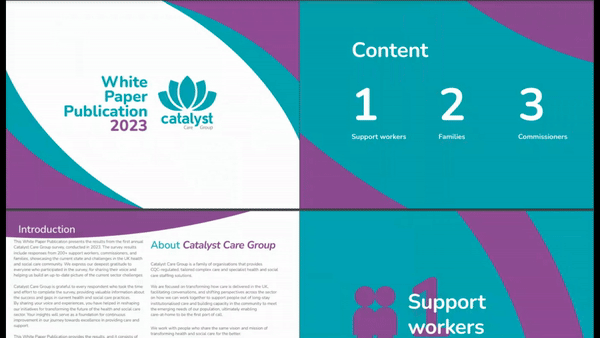Improving health and social care services requires consistent collaboration and informed decisions founded on evidence-based practices and personal experiences. To support the national service model in building the right support for people with lived experience, we conducted a white paper survey to gain a better understanding of what needs to be improved in our health and social care system.
By identifying the current gaps in our community, we can get closer to bringing people out of hospitals and preventing unnecessary admissions, delayed discharges and out-of-area placements. Our survey provides insights from families, healthcare assistants and commissioners on what needs to be improved in health and care.
The Importance of Healthcare Quality
Every individual has the right to access good health and well-being and contribute actively to the community. Recent surveys reveal people’s concerns about the current health and care provision and their perspectives for the future.
Among the care sector’s range of responsibilities, the highest priority and rising demand is creating places that promote safety, good health, and well-being.
Healthcare quality improvement starts with respecting people’s citizenship and the right to good health. To achieve that, we need to actively collaborate with our communities, people with lived experience, the NHS, local authorities and other stakeholders to build the conditions required for quality health.
Current Challenges in Health and Care Sector
In these challenging times, approximately 75% of individuals coping with mental health difficulties in England lack access to necessary care and support. Additionally, individuals aged 16-24 are less likely to receive mental health support compared to other age demographics. Moreover, over 2.5 million individuals aged 50 and above in England lack access to proper care, with thousands on waiting lists for support or a comprehensive assessment of their needs.
Supporting the transforming care agenda, Catalyst Care Group conducted a white paper survey in 2023 to identify the current challenges in the health and care sector through the eyes of commissioners and healthcare assistants.
Based on the responses, the health and social care commissioning insights outline the following challenges we must focus on finding solutions. This segment showcases the current gaps in the care sector and what commissioners felt needed to be improved to ensure access to quality service provision for the people in our community.
Additional Funding
Securing additional funding in the health and social care sector presents a significant challenge. Despite growing demands due to ageing populations, advancements in medical technology, and increasing complexities in health care needs, budgetary constraints often limit resources. Governments and organisations face tough decisions regarding resource allocation, balancing the provision of quality care with financial sustainability.
Insufficient funding can lead to longer wait times, reduced service quality, and inadequate support for frontline workers. Addressing this challenge requires innovative funding models, efficient resource utilisation, and collaborative efforts among stakeholders to ensure equitable access to essential services while navigating financial constraints.
Stronger Provider Market
The emergence of a stronger provider market poses significant challenges in the health and social care sector. These concerns concern quality, accessibility, and equity of care. Currently, there’s a risk of fragmentation and inconsistency in service delivery. Commissioners and social workers recognise the need for a stronger market provider to ensure standards of care, transparency, consistency, and accountability. The main focus is to provide person-centred, high-quality care to people with complex needs and ensure their rights are being met and respected.
Better Collaboration with Providers
Enhancing collaboration with providers is a critical challenge in the healthcare system. While collaboration is essential for delivering integrated and holistic care, achieving effective partnerships among diverse healthcare entities can be complex. Coordination between primary care providers, specialists, hospitals, social services, and community organisations is often hindered by fragmented systems, differing priorities, and communication barriers.
This lack of collaboration can result in gaps in care, inefficient resource use, and suboptimal health care outcomes. Overcoming this challenge requires fostering a culture of teamwork, implementing interoperable systems for information sharing, and incentivising collaborative approaches through policy and funding mechanisms. By working together seamlessly, providers can deliver more coordinated, person-centred care within the health service that addresses the diverse needs of individuals and communities.

Building the Right Support – Mission to Reality
The UK’s health and social care challenges are significant, and they require sustainability and consistency in operational processes to protect health and early interventions to minimise the need for hospital treatment and care. As care providers, we need to work closely with integrated care systems (ICSs) to build the right support for people and improve health and social care services.
The aim is to:
- Improve quality of care and outcomes for people
- Address inequalities in outcomes, experience and access to care in healthcare systems
- Enhance effectiveness and value for money
- Help the NHS develop better community services
Community care providers play a crucial role in improving the healthcare experience of people with additional needs. They bring expertise in supporting the well-being and independence of people with disabilities, mental ill-health, and older people. They provide temporary or 24-hour specialist care and support to people who can not live independently.
Focus on Prevention and Well-Being
Embracing transformation, we need to shift perspectives and start focusing on prevention rather than treatment. We need more preventive strategies and evidence-based care that prioritise cost-effective support and deliver better outcomes for individuals.
Health is More than Medical Care
Health encompasses far more than just medical care; it is a holistic state of well-being that includes physical, mental, emotional, and social aspects of life. While medical care plays a crucial role in maintaining health, factors such as access to nutritious food, safe housing, education, employment opportunities, supportive relationships, and a sense of purpose are equally important.
Addressing social determinants of health and promoting healthy behaviours are essential for preventing challenges and promoting overall well-being. Recognising the interconnectedness of various aspects of life is vital for achieving optimal health outcomes for individuals and communities alike.
An Investment in the Public’s Health
As a society, we need to focus on providing long-term resources to public health, which enhances the overall health of the community, improves care equity, and provides healthcare quality improvement. Investing in community care services helps reduce the long-term costs of hospital admission treatment and maintains sustainable health and social care services.
Catalyst Care Group is Dedicated to Transforming Care for The Better
As an organisation, we are dedicated to the principles of the Transforming Care Agenda, which are deeply rooted in a human-rights approach to care. Our primary focus is on enabling individuals to remain as close to the comforts of their homes as possible. At Catalyst Care Group, we strive to collaborate with colleagues across various systems to develop solutions that allow people to receive support within their own homes and communities. Our goal is to deliver person-centred, high-quality care, even in the face of perceived limitations.
Advocating for accessible healthcare and empowering communities to actively engage in their health journey is essential. We can ensure comprehensive care and equitable access to resources through collaboration among healthcare professionals, local authorities, and communities. By fostering qualities such as compassion, resilience, and adaptability, we pave the way for a future where everyone can experience dignity, support, and optimal health in every aspect of their lives.
To work with us on building proactive, progressive solutions for people, get in touch with us.










